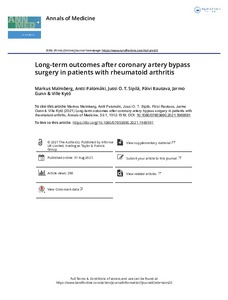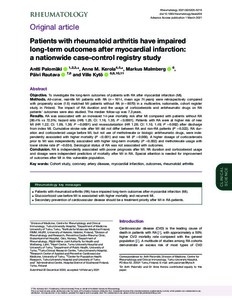Hae
Aineistot 11-20 / 38
Effects of Randomized Controlled Infancy-Onset Dietary Intervention on Leukocyte Telomere Length - The Special Turku Coronary Risk Factor Intervention Project (STRIP)
Reduced telomere length (TL) is a biological marker of aging. A high inter-individual variation in TL exists already in childhood, which is partly explained by genetics, but also by lifestyle factors. We examined the ...
Sydän- ja verisuonitautien ehkäisy kannattaa aloittaa jo vauvasta - STRIP-tutkimus näyttää miksi ja miten
Satunnaistetussa STRIP-tutkimuksessa 562 tervettä lasta sai tyydyttyneen rasvan saannin vähentämiseen tähtäävää ravitsemusneuvontaa kahdeksan kuukauden iästä alkaen 20 vuoden ikään asti, ja 545 saman ikäistä lasta seurattiin ...
Stroke hospitalization trends of the working-aged in Finland
BackgroundThe age-standardized incidence of stroke has decreased globally but, for reasons unknown, conflicting results have been observed regarding trend in incidence of major stroke subtypes in young adults. We studied ...
Outcome of acute myocardial infarction versus stable coronary artery disease patients treated with coronary bypass surgery
<p>Objective</p><p>To study the long-term outcome differences between acute myocardial infarction (MI) and stable coronary artery disease (CAD) patients treated with coronary artery bypass grafting (CABG). </p><p>Methods ...
Short- and long-term outcomes of infective endocarditis admission in adults: A population-based registry study in Finland
<p>Infective endocarditis (IE) is associated with high mortality. However, data on factors associated with length of stay (LOS) in hospital due to IE are scarce. In addition, long-term mortality of more than 1 year is ...
An Infancy-Onset 20-Year Dietary Counselling Intervention and Gut Microbiota Composition in Adulthood
The randomized controlled Special Turku Coronary Risk Factor Intervention Project (STRIP) has completed a 20-year infancy-onset dietary counselling intervention to reduce exposure to atherosclerotic cardiovascular disease ...
Long-term outcomes after coronary artery bypass surgery in patients with rheumatoid arthritis
<p><strong>Objective: </strong>To investigate the long-term outcomes of coronary artery bypass grafting surgery (CABG) in patients with rheumatoid arthritis (RA).</p><p><strong>Methods: </strong>Patients with RA (n = 378) were retrospectively compared to patients without RA (n = 7560), all treated with CABG in a multicentre, population-based cohort register study in Finland. The outcomes were studied with propensity score-matching adjustment for baseline features. The median follow-up was 9.7 years.</p><p><strong>Results: </strong>Diagnosis of RA was associated with an increased risk of mortality after CABG compared to patients without RA (HR 1.50; CI 1.28-1.77; p < .0001). In addition, patients with RA were in higher risk of myocardial infarction during the follow-up period (HR 1.61; CI 1.28-2.04; p < .0001). Cumulative rate of repeated revascularization after CABG was 14.4% in RA patients and 12.0% in control patients (p = .060). Duration of RA before CABG (p = .011) and preoperative corticosteroid usage in RA (p = .041) were independently associated with higher mortality after CABG. There were no differences between the study groups in 30-d mortality or in the post-operative usage of cardiovascular medications.</p><p><strong>Conclusions: </strong>RA is independently associated with worse prognosis in coronary artery disease treated with CABG. Preoperative corticosteroid use and longer RA disease duration are additional risk factors for mortality.Key messagesPatients with rheumatoid arthritis (RA) have impaired long-term outcomes after coronary artery bypass surgery (CABG).Glucocorticoid use before CABG and duration of RA are associated with higher mortality.Special attention should be paid in secondary prevention of cardiovascular disease in RA patients after CABG.</p>...
Digoxin use and outcomes after myocardial infarction in patients with atrial fibrillation
Digoxin is used for rate control in atrial fibrillation (AF), but evidence for its efficacy and safety after myocardial infarction (MI) is scarce and mixed. We studied post-MI digoxin use effects on AF patient outcomes in ...
Patients with rheumatoid arthritis have impaired long-term outcomes after myocardial infarction: a nationwide case-control registry study
<p><strong>Objective: </strong>To investigate the long-term outcomes of patients with RA after myocardial infarction (MI).</p><p><strong>Methods: </strong>All-comer, real-life MI patients with RA (n = 1614, mean age 74 ...









